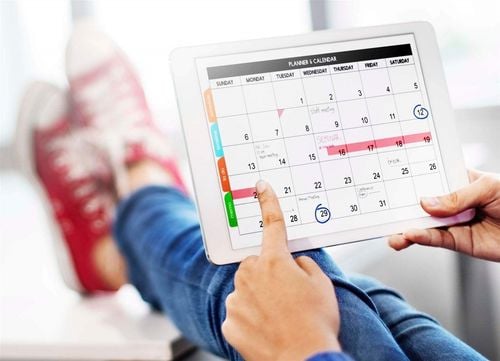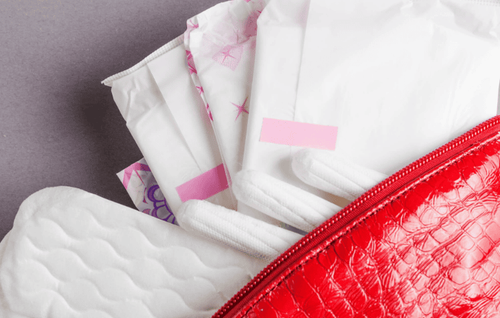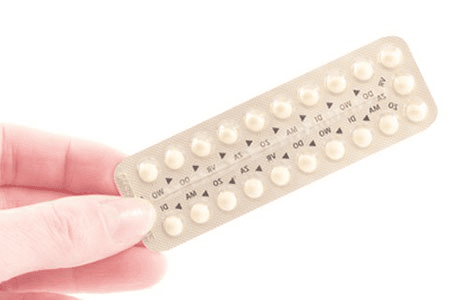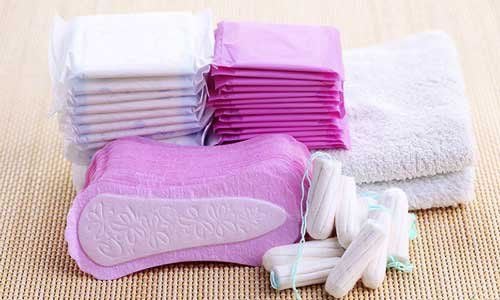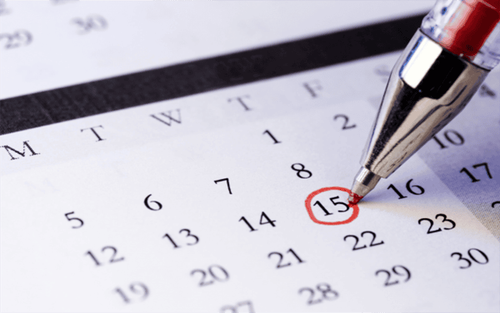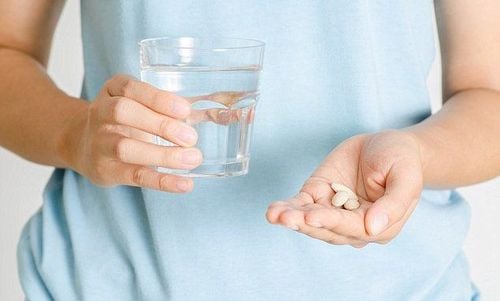This is an automatically translated article.
Menstruation for the first time can be confusing for many young people. However, you should understand this is the result of normal physiological development in the human body. Relax and learn how to get acquainted, recognize the signs of the first period to know how to handle it in time.
1. Signs of coming period for the first time
Signs of coming period for the first time may not be present for some people, when there are absolutely no other symptoms than usual. In addition, others may have symptoms of premenstrual syndrome (PMS) in the days before the start of their period.
Symptoms of premenstrual syndrome (PMS), or early signs of menstruation include:
Acne breakouts Abdominal pain Breast pain Back pain Constipation Diarrhea More fatigue than usual Emotions or irritability Cravings, especially sweets Clear or white vaginal discharge When these symptoms occur, you should prepare the following items in advance in case your period comes at any time:
Underpants clean Tampons Wet wipes Pain relievers , such as acetaminophen (Tylenol) MORE: Is breast pain a sign of an impending period?
2. Why menstruate?
Menstruation is the result of the normal development of the body. From the moment of her first menstrual period, a woman's body begins to become fertile.
Estrogen levels increase, which helps thicken the lining of the uterus. The lining of the uterus thickens to help fertilize an egg and develop into a fetus.
If the egg is not fertilized, the lining is shed every month and the egg is pushed out of the uterus. This leads to bleeding, also known as menstruation.
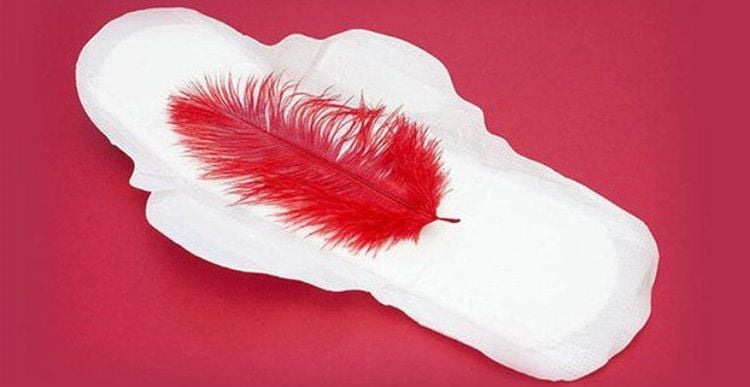
Kinh nguyệt là hiện tượng sinh lý bình thường ở nữ giới
3. At what age do you start menstruating?
Most people start menstruating between the ages of 12 and 13. However, for some, it can also come a little earlier or a little later.
As a general rule, your period should start about 2 years after your breasts start to develop.
4. How long does the first period last?
Your first period may last only a few days. It can take several months for your period to become regular. Once menstruation is regular, it can last for 2-7 days per month.
5. How much blood was the first period?
Most first period is usually light, with only a few reddish brown spots throughout the week. However, for some people, periods can be heavy right from the first period.
Menstruation will gradually become regular when hormone levels in the blood stabilize. The average person loses about 6 tablespoons of blood during each menstrual period, which is equivalent to 1/3 cup of water.
Heavy-than-average menstrual bleeding is usually not a cause for concern. However, if you feel like you've lost a lot of blood during your first period, tell a loved one or the healthcare provider at your school. In addition, you should also notify them when:
Have to change sanitary pads, tampons or menstrual cups every 1-2 hours Feeling headache, dizzy Feeling heart pounding Menstruation lasts more than 7 days Your symptoms will be told by your family to your doctor. They will determine if you are losing too much blood and provide medication to relieve those symptoms.
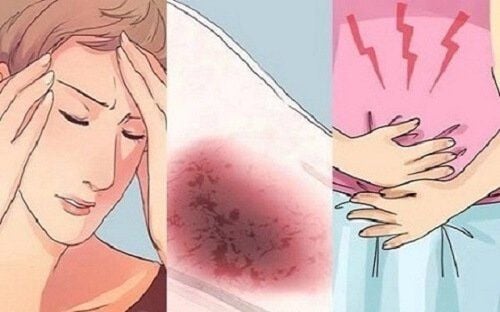
Dấu hiệu sắp có kinh nguyệt lần đầu xuất hiện khiến trẻ cảm thấy lo lắng, băn khoăn
6. Is it possible to get pregnant if you have a period?
Since your first period, you can get pregnant if the semen comes into contact with the vagina during sex.
In some cases, a woman may be able to get pregnant before getting her period. That's when the hormone that causes ovulation is released long before your period begins. Using a condom or other form of birth control is the best way to prevent pregnancy.
7. How to cope when your period comes unexpectedly
If your period comes without a protective pad, don't worry. Make a makeshift pad out of toilet paper before you find one. Here's how:
Take a long piece of toilet paper (at least 10 squares) and fold the layers on top of each other Place the toilet paper on your underwear, along between your legs Take another piece of toilet paper and wrap it around the panties a few times. This helps keep the tissue in place. Tuck the end of the paper towel into the top of the finished pad. You now have a makeshift pad. If you're at school, you might consider asking your teacher or healthcare provider for a pad or tampon.
8. Type of sanitary napkins for menstruation
8.1. Anti-spill panties
Anti-spill underwear has the same structure as regular underwear, but more specifically with the fabric that has the ability to absorb and prevent menstrual blood from overflowing.
Each type of spill-proof underwear has a different level of absorbency. If your period is light, you may just need to wear anti-spill underwear. But for those who menstruate more heavily, it is better to use anti-spill underwear as a support product in combination with an inner pad.
8.2. Sanitary napkin
Tampons are absorbent pads that are glued to underwear. Some models have extra "wings" to fold over the edges of the underwear to keep the pads in place.
Tampons should be changed after about 4 - 8 hours of use or when menstruation is heavy. Accordingly, tampons come in many different sizes. Each size is suitable for a different level of menstruation. But in general, the smaller the pad, the less likely it is to contain menstrual blood.
Sanitary pads with good absorbency are needed on the first day of menstruation and at night. After that, you can switch to using less absorbent bandages when the bleeding is less.
8.3. Tampon
Tampons are tampons that are inserted into the vagina to contain menstrual fluid before it flows into underwear. Some tampons may come with a plastic or cardboard lube. These tubes are designed to help you slide the tampon into your vagina. All tampons have a string at one end to pull it off.
Like tampons, tampons also come in different sizes and absorbency. Some tampons are made with fragrance but are not recommended because perfume can irritate the inside of the vagina.
Use the tampon by pushing it gently into the vaginal canal until only the outer cord remains. Tampons must be changed up to every 8 hours, or there is an increased risk of irritation or infection.
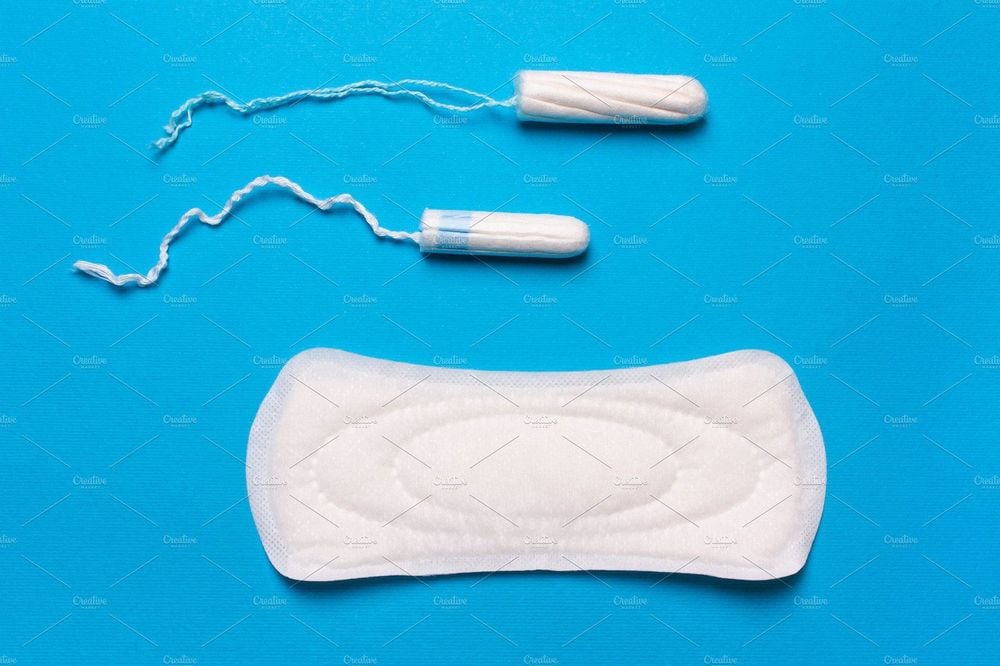
Khi xuất hiện dấu hiệu nhận biết sắp có kinh nguyệt lần đầu, bạn nên chuẩn bị tampo
8.4. Menstrual cup
Similar to tampons, a menstrual cup is inserted into the vagina to catch menstrual fluid before it leaves the vagina. Cups come in two sizes, small and large, categorized based on age and parenting experience.
Instructions for using a menstrual cup are similar to tampons. However, unlike tampons, most menstrual cups are reusable. This means that when you change the cup, you simply take the cup out, clean it, and put it back on.
Menstrual cups should not stay in the vagina for longer than 12 hours/time. Leaving the cup on for more than 12 hours may increase the risk of irritation or bacterial infection. Depending on the brand, the lifespan of a menstrual cup lasts from 6 months to 10 years with proper care.
9. What to do in case of ice overflow?
Menstruation for the first time may take more time to learn about the amount of menstrual fluid and when it's the most to prevent ice overflow. During this stage, it's best to keep a few stain wipes in your bag. Wipes can provide temporary fabric cleaning until you get home to properly launder the fabric.
Alternatively, you can choose to tie a jacket or sweater around your waist to cover the stain until you can change.
At home, you can choose from the following solutions to clean dirty fabrics:
Soak the stained fabric in cold water as soon as possible. Warm or hot water will cause the stain to stick to the fabric, so make sure the water is cold. If you have a stain remover handy, spray it on the fabric. Make sure the contaminated area is soaked for the length of time recommended by the manufacturer. Rub soap into the affected area. Wash until the stain comes off. Wash the garment in the washing machine if the stain is not completely removed provided that cold water is used instead of warm or hot water. Let the clothes dry naturally in the sun. Drying can make residual stains stick longer.
10. Menstruation, does anyone know?
No one will be able to detect that you are menstruating unless you smell a bad smell from the pads being left on for too long. If you're worried about bad breath during your period, gently rinse the vaginal area with warm water.
Fragrance tampons and other menstrual products can irritate the vagina. Therefore, you need to choose carefully before buying this product.
11. Can I go swimming or play sports on the day of my period?
You can absolutely go swimming or play sports on the day of your period. In fact, exercise can reduce menstrual cramps and discomfort.
When swimming or playing sports, use tampons or menstrual cups with good absorbency to avoid ice spills underwater and during exercise.
12. What about abdominal pain on the day of menstruation?
Dysmenorrhea can be treated with the following methods:
Use an over-the-counter medication, such as ibuprofen (Advil) or naproxen sodium (Aleve) according to the instructions on the package Use a heating pad, cloth heating pad Place on your stomach or back Soak in a hot tub In case of feeling nauseous, unable to get out of bed, unable to participate in daily activities, you should notify your loved one so that they can be taken to the doctor to rule out pathological causes such as endometriosis.
13. How to track your menstrual cycle?
Some of the following applications you can refer to to use to track your menstrual cycle:
Clue Period Tracker & Calendar Flo Period & Ovulation Tracker Eve Period Tracker App Fitbits
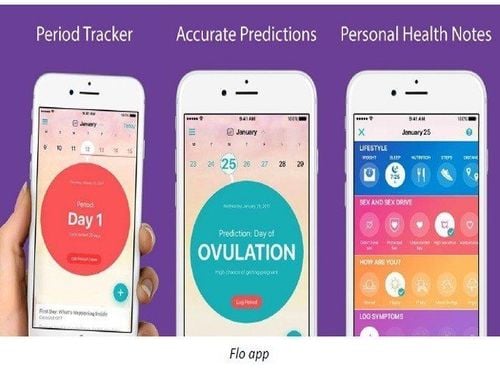
Một số app giúp bạn theo dõi kinh nguyệt tiện lợi, chính xác
14. Do you have to have periods for the rest of your life?
Menstruation doesn't happen for the rest of life, but it does for a long time until menopause. Menopause usually begins between the ages of 45 and 55.
If you want to stop your periods completely, you can talk to your doctor about hormonal birth control or other forms of stopping periods.
15. When to see a doctor?
You should notify your loved ones so they can take them to the doctor soon in the following cases:
No period when you turn 15 You have had periods for 2 years but are irregular Menstruation 2 times/month Severe abdominal pain impact on daily activities Bleeding so much that you need to change tampons every 1-2 hours Menstruation lasts more than 7 days When you come to the doctor, you may be asked about the following:
Start date How long ago did you start and end your last period?
The first time you noticed abnormal bleeding and other symptoms
16. How to guide the baby in the first menstrual period?
As a parent or guardian, it can be difficult to know how to best guide your child to the menstrual cycle. Here are some ways parents can use it as a reference:
Assure your child that having periods is a normal part of life Explaining different menstrual products and how to let them choose The one that's right for you Help your child create a menstrual kit that includes a set of llots, stain wipes, and tampons for easy storage in a backpack or closet. In addition, parents can also provide more experiences based on their own menstrual cycle for many years such as:
Pain relievers that are good for menstrual cramps Measures to reduce bloating and gas Abdominal Use baking soda or other products to remove stains from clothes The signs of the first period can be different for each person, so in case you do not know how to deal with your first period, you You can ask for help from family members. When there are abnormal signs, it is necessary to go to the medical center soon for examination and screening for gynecological pathology.
Please dial HOTLINE for more information or register for an appointment HERE. Download MyVinmec app to make appointments faster and to manage your bookings easily.
References: healthline.com, .medicalnewstoday.com




